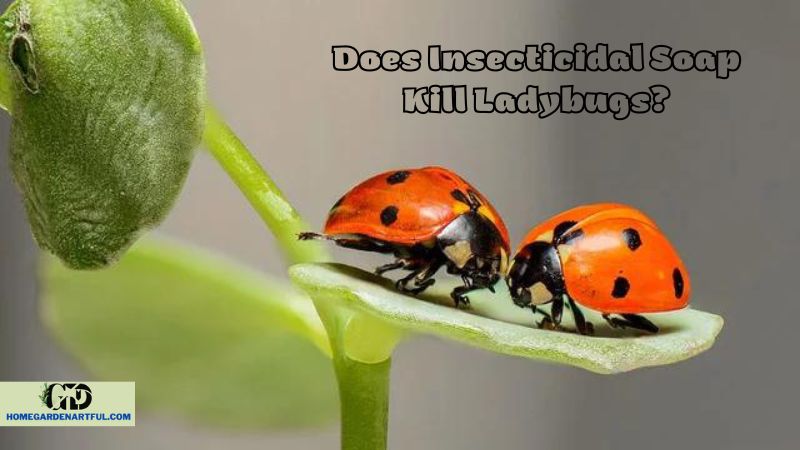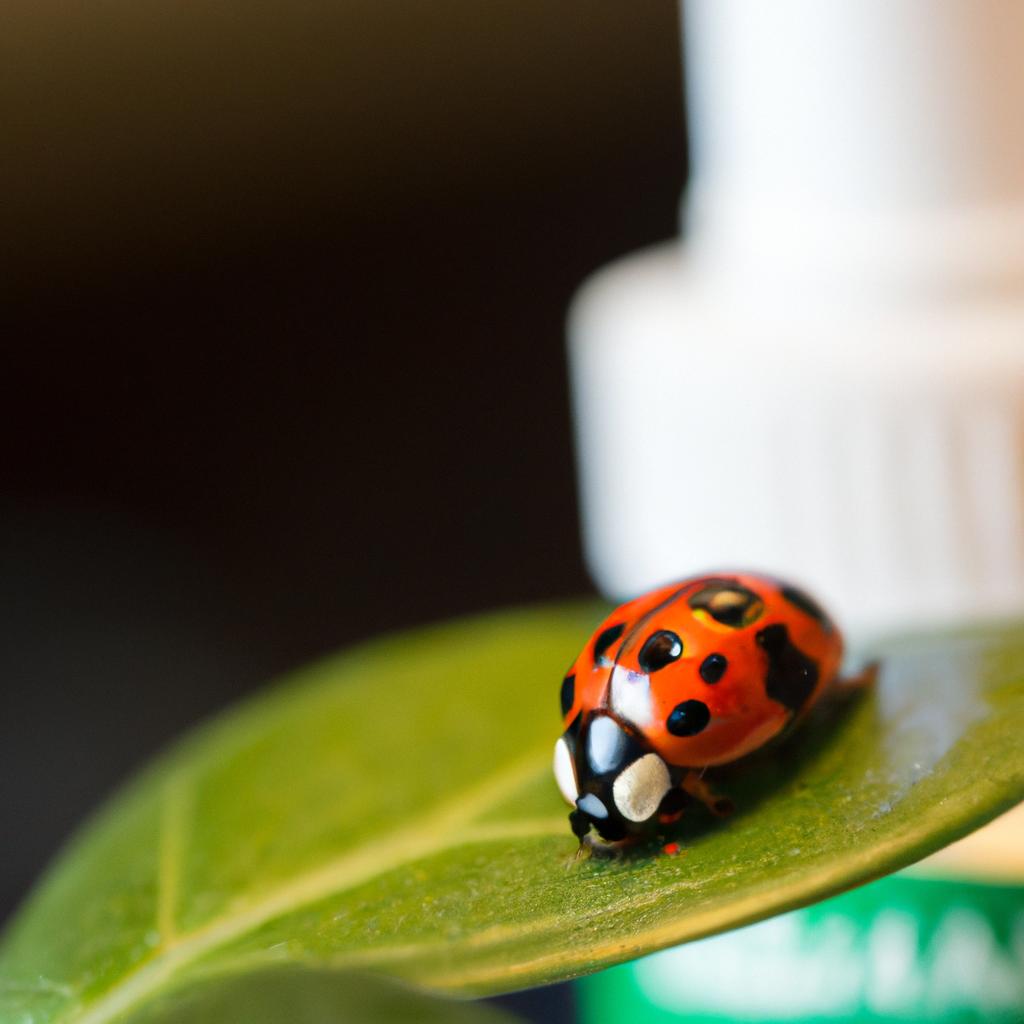Introduction
Ladybugs, those seemingly delicate and charming creatures, are not just a delight to the eyes but also play a crucial role in maintaining the balance of our gardens. These vibrant insects are nature’s own pest control agents, effectively preying on harmful pests such as aphids, mealybugs, and mites. However, when unwanted pests invade our beloved plants, homegardenartful often turn to insecticidal soap as a solution. But here’s the burning question: does insecticidal soap kill ladybugs too?
Before we dive into the answer, let’s take a moment to understand the significance of ladybugs in our thriving green spaces. Ladybugs, also known as lady beetles or ladybird beetles, are not just a delightful sight; they are voracious predators with a hearty appetite for garden pests. These little helpers can devour hundreds of aphids in a single day, saving our plants from infestations that could stunt their growth or even lead to their demise.
Insecticidal soap, on the other hand, has gained popularity as an eco-friendly and chemical-free method to combat common garden pests. Made from naturally derived ingredients such as potassium salts of fatty acids, this soap disrupts the outer protective layer of pests, causing dehydration and ultimately leading to their demise. It’s an appealing option for those seeking to avoid harsh chemicals in their gardens. However, its impact on ladybugs is a valid concern that needs evaluation.
So, the burning question remains: does insecticidal soap harm our beloved ladybugs? Let’s explore the answer together and shed light on this intriguing topic.
Understanding Ladybugs
Brief Description of Ladybugs and Their Role in Natural Pest Control
Ladybugs, also known as lady beetles or ladybird beetles, are charming insects that capture our attention with their vivid colors and distinctive spots. These small creatures may seem delicate, but they possess a mighty appetite for garden pests. Ladybugs are natural predators, preying on harmful insects like aphids, mealybugs, scale insects, and mites that can wreak havoc on our cherished plants.
Ladybugs have a voracious appetite and can consume a large number of pests in a short period. Just one adult ladybug can devour up to 50 aphids in a day! Their feeding habits make them an invaluable asset in the fight against garden pests. By keeping populations of these pests in check, ladybugs help to maintain the health and vitality of our gardens without the need for harmful chemicals.
Benefits of Having Ladybugs in Gardens
Having ladybugs in our gardens offers a multitude of benefits. Firstly, ladybugs act as natural pest control agents, reducing the need for chemical interventions. By consuming detrimental insects, they help prevent plant damage and infestations that can stunt growth or even lead to plant death.
Furthermore, ladybugs are a sign of a healthy ecosystem. Their presence indicates the presence of other beneficial insects and a balanced environment. By attracting ladybugs to our gardens, we encourage a diverse array of organisms that contribute to the overall health and resilience of our plants.
Ladybug Lifecycle and Behavior
To understand how ladybugs contribute to natural pest control, it’s essential to delve into their lifecycle and behavior. Ladybugs undergo complete metamorphosis, starting as eggs, then progressing to larvae, pupae, and finally transforming into adult ladybugs. During their larval stage, ladybugs are particularly voracious, consuming pests with great enthusiasm.
Ladybugs are attracted to gardens that provide them with a suitable habitat, food sources, and shelter. They are drawn to plants with ample nectar and pollen supply, as well as plants that harbor aphids and other soft-bodied insects. Creating an environment that supports ladybug populations involves selecting the right plants, avoiding pesticide use, and providing areas for overwintering.
Understanding the intricacies of ladybug biology and behavior allows us to appreciate their important role in maintaining the delicate balance of our gardens. Now that we’ve explored the world of ladybugs, let’s uncover the impact of insecticidal soap on these beloved insects.
What is Insecticidal Soap?
Definition and Composition of Insecticidal Soap
Insecticidal soap, as the name suggests, is a soap-based solution specifically formulated to combat garden pests. It is typically composed of potassium salts of fatty acids, which are derived from plant oils or animal fats. These fatty acids act as the active ingredients that target and eliminate unwanted insects.
How Insecticidal Soap Works as a Pesticide
The mechanism behind insecticidal soap’s effectiveness lies in its ability to disrupt the protective outer layer of pests. When sprayed onto the insects, the soap penetrates their bodies and breaks down the waxy surface that helps them retain moisture. As a result, the pests experience excessive dehydration, leading to their demise.
Unlike conventional pesticides, insecticidal soap works through physical means rather than chemical toxicity. It does not leave behind harmful residues that can persist in the environment, making it a safer choice for both plants and beneficial insects.
Common Uses and Effectiveness of Insecticidal Soap
Insecticidal soap can be used to control a wide range of common garden pests, including aphids, whiteflies, spider mites, and mealybugs. It is particularly effective against soft-bodied insects that lack a protective exoskeleton. When applied correctly, the soap can suffocate and eliminate these pest populations, helping to preserve the health and vitality of your plants.
It is important to note that while insecticidal soap is highly effective against pests, its impact on beneficial insects like ladybugs is a subject of concern. To ensure the well-being of ladybugs and other beneficial insects, it is crucial to use insecticidal soap judiciously and follow proper application guidelines.
Now that we have a better understanding of what insecticidal soap is and how it functions as a pesticide, let’s move forward to explore its potential impact on our beloved ladybugs.

The Impact of Insecticidal Soap on Ladybugs
A. Examining the Potential Effects of Insecticidal Soap on Ladybugs
When considering the impact of insecticidal soap on ladybugs, it’s essential to assess the potential effects it may have on these beneficial insects. Ladybugs, with their soft bodies, may be susceptible to certain substances, including insecticidal soap. However, the severity of the impact can vary depending on various factors.
Ladybugs may come into contact with insecticidal soap if they are directly sprayed or if they encounter plants treated with the soap. The soap’s mode of action disrupts the outer protective layer of insects, leading to dehydration. While this mechanism can be effective against pests, it may also pose a risk to ladybugs. The delicate nature of ladybugs’ exoskeleton raises concerns about potential harm.
B. Research Studies and Findings on Ladybug Mortality Due to Insecticidal Soap
To gain a clearer understanding of the impact of insecticidal soap on ladybugs, researchers have conducted studies to assess ladybug mortality rates when exposed to this pesticide. Some studies have shown that insecticidal soap can cause harm to ladybugs, resulting in varying degrees of mortality. However, it is important to note that the mortality rates observed in these studies can be influenced by several factors.
The concentration of the insecticidal soap, the frequency of exposure, and the specific species of ladybugs are factors that can affect the outcome. Research indicates that certain species of ladybugs may be more resilient to insecticidal soap than others. Additionally, using insecticidal soap in accordance with the product’s instructions, such as diluting it properly and applying it during the appropriate time of day, can minimize the potential harm to ladybugs.
C. Factors Influencing the Impact of Insecticidal Soap on Ladybugs
Several factors come into play when determining the impact of insecticidal soap on ladybugs. Firstly, the concentration of the soap used is crucial. It is important to follow the recommended dilution rates to ensure that the concentration is at a level that effectively targets pests while minimizing harm to ladybugs. Secondly, the timing of application is significant. Applying the soap when ladybugs are less active, such as early morning or late evening, can reduce the chances of direct contact.
Furthermore, environmental conditions and the overall health of ladybug populations can influence the impact of insecticidal soap. Ladybugs are more likely to withstand exposure to insecticidal soap if they have access to ample food sources and suitable habitats. Maintaining a diverse and thriving garden ecosystem can support ladybugs and mitigate the potential harm caused by insecticidal soap.
In conclusion, while insecticidal soap can have an impact on ladybugs, the severity of this impact depends on various factors. By considering these factors and using insecticidal soap responsibly, we can strike a balance between pest control and preserving the valuable presence of ladybugs in our gardens.
Safe Alternatives to Insecticidal Soap for Ladybug-Friendly Pest Control
When it comes to pest control in your garden, you don’t have to rely solely on insecticidal soap. There are several safe and ladybug-friendly alternatives that can effectively keep unwanted pests at bay while preserving the well-being of these beneficial insects. Let’s explore some organic pest control methods, companion planting techniques, and practices to attract and protect ladybugs in your garden.
A. Organic Pest Control Methods that Do Not Harm Ladybugs
- Neem Oil: Derived from the neem tree, neem oil acts as a natural insect repellent and disrupts the life cycle of pests. It targets pests while leaving ladybugs unharmed. Dilute the oil according to the manufacturer’s instructions and apply it to affected areas.
- Diatomaceous Earth: This powdery substance is made from fossilized algae and works by physically dehydrating pests. It is safe for ladybugs but should be used sparingly as it can harm other beneficial insects if overapplied.
- Garlic Spray: Create a homemade garlic spray by blending garlic cloves with water and straining the mixture. This potent spray repels pests without causing harm to ladybugs.
B. Companion Planting and Natural Predators as Alternatives
- Companion Planting: Certain plants naturally repel pests or attract beneficial insects like ladybugs. Planting marigolds, dill, fennel, and yarrow near vulnerable plants can help deter pests and encourage ladybugs to visit your garden.
- Attracting Natural Predators: Ladybugs have a voracious appetite for pests, so creating a welcoming environment for them can work wonders. Provide shelter by leaving leaf litter, rocks, or wooden structures in your garden. Additionally, consider installing ladybug houses or offering small water sources for these helpful insects.
C. Practices to Attract and Protect Ladybugs in Gardens
- Avoid Chemical Pesticides: Minimize or eliminate the use of chemical pesticides in your garden as they can harm ladybugs and other beneficial insects. Opt for natural and eco-friendly alternatives instead.
- Provide Food Sources: Ladybugs need nectar and pollen to thrive. Planting flowers such as daisies, cosmos, and dandelions will attract ladybugs and provide them with a much-needed food source.
- Avoid Overcleaning: Ladybugs often lay their eggs on the underside of leaves or in hidden areas. Avoid excessive pruning or cleaning to preserve these potential nurseries.
By adopting these ladybug-friendly pest control methods, you can maintain a healthy garden while safeguarding these incredible insects. Remember, creating a harmonious environment for ladybugs not only protects your plants but also contributes to the delicate balance of nature.
Conclusion
In conclusion, when it comes to the question of whether insecticidal soap kills ladybugs, the answer is both yes and no. While insecticidal soap can potentially harm ladybugs if directly sprayed on them, its impact on ladybug populations as a whole is minimal compared to its effectiveness in controlling garden pests. It is important to exercise caution and avoid spraying insecticidal soap directly on ladybugs or their eggs to ensure their safety.
To maintain a ladybug-friendly garden while effectively managing pests, it is recommended to explore alternative pest control methods that do not harm these beneficial insects. Organic pest control methods, such as introducing natural predators like lacewings or encouraging companion planting, can help maintain a healthy balance in your garden without posing a threat to ladybugs.
Remember, ladybugs are not just beautiful creatures; they are valuable allies in the fight against garden pests. By adopting ladybug-friendly pest control strategies, we can ensure a thriving garden ecosystem while minimizing the use of potentially harmful chemicals.
So, the next time you find yourself wondering about insecticidal soap and its impact on ladybugs, remember that these gentle insects are more resilient than we may think. Let’s embrace nature’s harmony and create a garden haven where ladybugs can thrive alongside our flourishing plants.
In the end, it is our responsibility to strike a balance between pest control and the well-being of beneficial insects like ladybugs. By doing so, we can nurture a garden that not only captivates our senses but also supports a diverse and harmonious ecosystem.
Keep your ladybugs safe, and let them continue their important mission of protecting our gardens.


